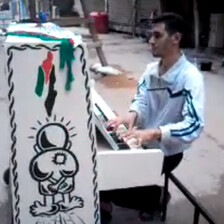The Electronic Intifada 29 September 2003
“Remember the solidarity with the Palestinian people. It is a real moral and just cause that people have and a commitment to themselves.” Prof. Edward Said - June 15, 2003
On September 25, 2003, I received the somber news of the passing of Palestinian Professor Edward Said, at the age of 67. I like many others felt an unbearable loss of one Palestinian hero who had influenced and inspired my quest to ameliorate the long, unjust and unabated suffering of the Palestinian people. Professor Said was one of a kind.
For decades, his scholarly literary works, such as “Orientalism”, published in 1974, presented an authentic history and admirable portrayal of Arab and Islamic civilization, in today’s world. His rationale wisdom and deep moral convictions opened the minds and thoughts of critical thinkers to better understand the rich history of Arabs and Muslims. The world-renowned Palestinian intellectual, Columbia University scholar, literary figure, accomplished pianist, and an immensely articulate voice of human existence, were the poetry of richness and the mere diversity of human existence.
While working for the Palestine Human Rights Campaign (PHRC) in Chicago, as a young Palestinian American in the early 80’s, Prof. Said served as one of our Board members. It was during those years, that I read several of his books and recognized the unique merits of Prof. Said’s tremendous ability to articulate, debate, and establish the moral and basic truths of the Palestine struggle.
As I reflect upon the time when many organizations, universities and peace groups in Chicago, had extended an invitation to Prof. Said to be their guest speaker, it was without hesitation, and no matter how great the distance, my circle of professional Indian friends and the supporters of Palestinian human rights, and solidarity would delegate time in their busy schedules to attend his lecture.
Even after his lectures, he would graciously take the time to meet with my Indian friends who were avid supporters of the Palestinian cause. He was their hero who championed the Palestinian cause for human dignity, justice and freedom. A Palestinian guru.
Prof. Said was an ingenious man who spoke candidly about the truth, world cultures and the inherent dignity of Arab and Muslim civilization and life.
Prof. Said’s in sync rhetoric and written analysis of the critical rationale of logic on the Question of Palestine, assisted in transforming people’s minds and attitudes within mainstream America and throughout the world. He never faltered in his commitment to his people. He once said, “Remember the solidarity with the Palestinian people. It is a real cause that people have and a commitment to themselves.” Prof. Said was truly a Renaissance man who touched the lives of many of us in the 21st century, at a time that can be best described as the Age of Reason or enlightenment on the Question of Palestine.
As an avid and accomplished musician, Beethoven, the classical pianist, was his favorite. The Ninth Sympathy, by Beethoven, was one of his great achievements. This was Beethoven’s last symphony and also known as the Choral symphony. Its finale is a musical setting of Friedrich Von Schiller’s ‘Ode to Joy,” a hymn, to the unity and freedom of humanity. And just like the symphonic cadences of Professor Edward Said’s Ode to Palestinian freedom, dignity and truth, Prof. Said’s overture will continue to resonate till the gates of Palestinian justice, self-determination and statehood are opened wide.
Profoundly committed to the righteousness of the Palestinian struggle for justice, Professor Said was one of the hammering wedges between the closed gates of Palestinian liberation and freedom. And now the hammer has been passed on to us as Palestinians, peacemakers and people predisposed of rationale truths and logic. We must all unify our efforts to continue to pry the gates of freedom open. Professor Edward Said’s legacy is the force between our wings; our righteous path to universal freedoms, dignity and pride. The symphony plays on…a Raison d’être.
Leila Diab is an educator and writer.

